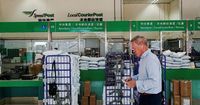On April 16, 2025, Hongkong Post officially announced the suspension of postal services for parcels sent to and from the United States, effective immediately. This decision comes amid escalating trade tensions between the U.S. and China, particularly after the recent U.S. government increase in tariffs on imported goods, including those from Hong Kong.
The new U.S. tariff adjustments have created unforeseen uncertainties and costs in the process of transporting and handling parcels. Specifically, the U.S. eliminated the "de minimis" tax exemption for shipments valued under 800 USD from Hong Kong. This exemption previously allowed small value shipments to bypass taxes and customs inspections, making cross-border trade more accessible.
A spokesperson from Hongkong Post expressed regret over the decision, stating, "We are sorry to have to make this difficult decision. However, with the sudden changes and unreasonable tax rates from the U.S., maintaining normal postal services has become infeasible at this time. We are working to assess the situation and seek alternatives to mitigate the impact on users." This suspension is expected to significantly impact cross-border e-commerce activities, especially platforms like Shein and Temu, which rely on transporting affordable goods directly from Hong Kong to U.S. consumers.
Businesses that engage in transactions with the U.S., as well as individuals needing to send and receive parcels between the two regions, will be affected. Items impacted include clothing, consumer electronics, toys, and other consumer products. Hongkong Post has suspended sea mail services to the U.S. immediately from April 16, 2025, while airmail services are expected to be halted starting April 27, 2025.
Analysts suggest that Hong Kong's decision may be an indirect response to the new U.S. trade policy, reflecting concerns about the negative impacts on the global supply chain and logistics operations. Currently, Hongkong Post is advising residents and businesses to closely monitor announcements and prepare for potential changes in the near future. The timeline for the restoration of postal services between Hong Kong and the U.S. remains unclear.
In a related development, the Hong Kong government cited President Trump's recent decision to remove the de minimis exception as a significant factor in their announcement. This change means that shipments valued at 800 USD or less, which were previously exempt from tariffs, will now face a staggering increase in costs.
Under the new regulations, these goods will be subjected to a 120% tax starting May 2, 2025, as outlined in an executive order signed by President Trump earlier this month. The initial tax was set at 30%, but the latest directive has dramatically escalated the financial burden on both businesses and consumers.
As a result of these changes, companies and individuals in Hong Kong will now have to rely on private express delivery services like FedEx and DHL for their shipments, further increasing costs. This situation not only complicates logistics but also poses a challenge for consumers who are already facing heightened prices due to tariffs.
Hong Kong has long been recognized as an open and free international trading port, characterized by minimal import taxes and no sales tax. However, the recent shift in U.S. policy has put this status at risk, as the territory now faces tariffs of up to 145% on exported goods.
Chief Executive John Lee of Hong Kong announced intentions to file a complaint with the World Trade Organization (WTO) regarding the U.S. tariffs, signaling the government's commitment to addressing what they view as unfair trade practices. This complaint is part of a broader strategy to safeguard Hong Kong's economic interests and maintain its status as a key player in global trade.
In response to these developments, the Chinese government has also indicated plans to file a complaint with the WTO, asserting that the new U.S. measures violate international trade rules. This escalating trade conflict raises concerns not only for Hong Kong but also for the broader global economy, as both regions grapple with the repercussions of heightened tariffs and trade restrictions.
As the situation evolves, stakeholders in both Hong Kong and the U.S. are left to navigate the complexities introduced by these changes. The suspension of postal services is just one of many challenges that businesses will face as they adapt to a new trade landscape characterized by increased costs and regulatory hurdles.
The long-term implications of these trade tensions remain uncertain, but the immediate effects on cross-border commerce are already being felt. As Hong Kong seeks to mitigate the impact of U.S. tariffs, the focus will be on finding alternative solutions and maintaining economic stability in the face of unprecedented challenges.




